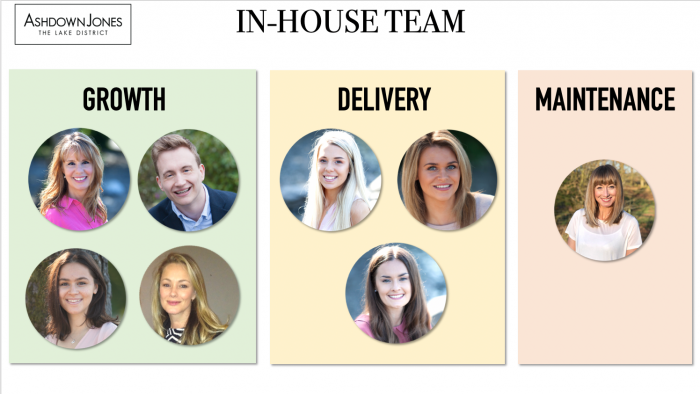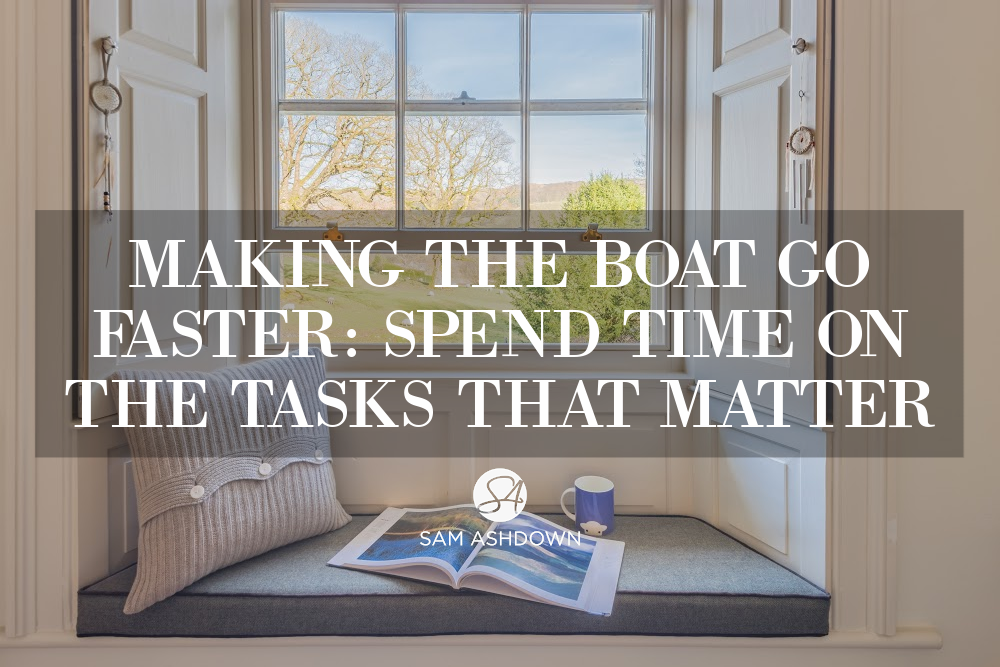Do you sometimes feel that time is passing you by? That you sit down to work on the most important tasks in your agency, and end up doing the same-old, same-old things? If you want to be the best, and build a really special agency, you need to pay very close attention to what you actually do – every hour, every day, every week. Let me show you how.
Have you ever done a ‘time audit’ in your agency? It’s something I get my clients to do, and they tell me how enlightening it is. Here’s how it works.
All you need to do is record every task you do, at half-hour intervals, all day. This audit is not just for your team; it’s for you, too. This will show you what you’re all spending your time on, if you’re expending the most amount of time and effort on the activities that are going to bring you the biggest return on investment, and even whether people are in the right job.
For example, if you ask Jane and Tom to conduct their own time audits, and it’s clear Jane is spending half the time Tom is on uploading properties to Rightmove, perhaps it’s time to give Tom some extra training, or perhaps move him onto a task that suits his skill-set better.
Sara Smith from Smith and Co, Mansfield told me recently: “It was so valuable, we’re going to do it on a regular basis. Not only did it highlight where we were all wasting time, or spending time on the wrong tasks, it also made us so much more productive, knowing we were writing down what we were actually doing!”
[To get a copy of our Time Audit template, click here]
Our AJ Team Structure
When we launched AshdownJones, we knew we needed to get not only the best team members on board, who would share our vision and goal for AshdownJones, but also create and implement a team structure that would best support them and enable them to do an amazing job for our clients.
Every member of our team feels valued as a person, not just as someone filling a job role. Every job role – without exception – has been changed, moulded and enhanced specifically to better fit the team member carrying out that job role, so they feel happier, and fulfilled. Coming to work every day never feels like a chore: each of us genuinely looks forward to it.
To support our team structure, we use the M-D-G Team Structure that I created and refined some years ago, and now teach to our clients. It stands for Maintenance-Delivery-Growth and it works like this:
Maintenance – this is the foundation of the business; the basics that are vital to get right. This is answering the phone, replying to emails, keeping the books straight, and practical office management.
The best ‘Maintenance’ team member is someone who is highly organised and efficient, and loves a tidy desk. Lois is our Office Manager, and is a perfect fit for the role. She keeps everyone’s diaries up to date, books viewings, arranges key handovers, makes sure we have enough milk and tea bags, and generally acts as our wonderful team PA.
Delivery – our team managing delivery consists of Hannah and Tess, our Client Executives, or as we like to call them, our ‘Client Happiness Officers’. As our main client liaison, it’s super-important they look the part; dealing with high net worth individuals and multi-million-pound properties means that their image and service levels have to be of the very highest order. It’s their job to ensure that our clients are always delighted with the experience of selling their home, including the styling visits, photoshoots and viewings. Of course, they are responsible for our beautiful marketing and brochures, and so have to effectively manage a freelance team of 8, but the result is not as important to the client as their experience of getting there, we have found.
So, in addition to delivering the service the client expects, they also go above and beyond, collecting them from the train station, organising garden tidies and boiler repairs, and answering texts at unsocial hours for overseas clients on different time zones. On one particularly memorable occasion, Hannah Facetimed a client in Switzerland for over an hour, to show her a house, and she is now buying that million -pound house from us! In short, Tess and Hannah are responsible for delivering on our promise of a truly differentiated experience.
Also in our Delivery department is Rebecca, our full-time designer. No other estate agency of our size has an in-house designer, and it is a testament to our prioritisation on bespoke marketing that we choose to keep it in-house. Rebecca is an extremely talented designer, having won a First in Illustration at university, and creates beautiful bespoke marketing for each home that our clients adore.
Growth: Phil and I, as the founders and directors, are ultimately responsible for the growth and therefore longevity and sustainability of AshdownJones. It’s our job to ensure we generate enough leads for the business, and to convert those leads to sales and profit. We have a meticulous plan for content, direct mail, community building and social media, and follow it rigorously. We set targets and review them as a team in every weekly meeting.
To support the marketing plan, Naomi, our Business Development Executive, is tasked with driving the business forwards and helping project manage and implement new ventures and revenue streams.
Tilly, our gifted Digital Marketing Assistant, manages our websites and all the digital content, including lead generation funnels and initiatives.

Our wonderful team
.
Where are you spending your time?
Let’s look at it another way. Let’s say that your Maintenance tasks are worth around £10 an hour, (after all, these expenses go straight to the cost base of your business), your Delivery tasks are worth say, £100 an hour, and your Growth tasks are worth £1,000 an hour.
Say, for example, that you’re in a market appraisal with a landlord that has a large portfolio, and is considering giving you his business. That meeting could actually be worth many thousands of pounds to you, over the coming years. And let’s face it, these kinds of meetings are what you’re good at: talking to prospective clients, telling them how you can help them, signing them up. Imagine you spent the majority of your time on tasks like these, how your business would grow. Another £1,000-an-hour level of task could be conducting a growth planning meeting. When Phil and I do this, just spending two or three hours working on new initiatives could be worth hundreds of thousands of pounds to our agency over decades to come. Only recently, we spent a couple of hours creating a new marketing campaign that won us a £15,000 instruction within a month of that meeting; not a bad financial return on our time investment.
Tasks that could earn you £100 an hour, are those client-facing tasks that your ‘client care’ team should be doing. These require skill and experience, and also take time and effort. So, photography, viewings, brochure-creation, styling visits and offer negotiation, all fall under the £100-an-hour activities.
The £10 an hour tasks are mostly admin. These are things you should avoid doing wherever possible. My rule for these tasks is to ask myself if I could explain the steps needed to carry out this task on a one-page document. I call this a task sheet. If you can create a task sheet for it, you can give it to someone else to do, and if you’ve written the steps thoroughly, they can do it just as effectively and accurately as you can. If you don’t have someone in your organisation you can delegate these tasks to, you can outsource them. For years, I didn’t have office staff, but instead had a ‘virtual’ assistant, who I still work with. She’s based overseas and does all my admin tasks for me, often (usually) better than I could do them myself. Remember, if you don’t have an assistant, you are an assistant. If Richard Branson had stayed in Maintenance, his 400 businesses wouldn’t exist. He focused solely on Growth and that’s why he’s super successful today.
You need to take back control of your business
So how can you get off the problem-solving, email-answering, phone-jumping conveyer belt, and into pilot mode?
The first step to take is often the most difficult: stop opening your email in the morning. Almost any issue can wait until noon, and anyone who simply has to get your attention before then will have to call you. If you’re too worried you’ll miss something vital, re-route your emails through your PA, or office manager. I routinely open my emails three times each day: noon, around 4pm, then just after I close down for the day. People soon get used to not getting an instant reply, trust me.
Second, write down your three biggest challenges, initiatives or projects, somewhere very visible. Maybe you have a whiteboard, or you can print them out and put them behind your desk, or in the office kitchen. We use ‘Magic Whiteboards’ to do our planning, which we find great. We simply cover the walls of our training room with them, and then we can plan to our hearts’ delight.
These three challenges are not ‘to-dos’ though. They are milestones. They are significant projects. I tend to write ours across the top of a whiteboard, so I can write the relevant to-dos underneath, and allocated responsibility and deadlines to each one. Then we review these in our weekly meetings.
Finally, grab your diary and make some space. Allot time – not for working in your business – but for working on your business. Put a big line through these sections in your diary, and let everyone know you are not available at those times. A very successful entrepreneur I know blocks off one day every week like this. He calls these his red days and works from home or a local coffee shop. He doesn’t open his email, and his staff know not to call him unless the building is burning down. He tells me that these 40+ red days he takes each year are fuel for his business. Without them, he’s just a really good problem solver, when what his business needs is a captain.
What will make your boat go faster?
Is it to create new, exciting marketing initiatives? To develop and implement a fee-raising strategy? Or to produce a plan to better sell the properties you have listed?
To continue with our seafaring metaphor, whilst you’re in the engine room, no one is steering the boat. And only the captain knows the exact destination, and takes responsibility for the outcome of the journey too. If you’re not the captain, your business has no direction; it’s simply at sea, bobbing aimlessly, and could easily be scuttled at any time by pirates, aka your competitors, who are out there, waiting to exploit your weaknesses.
Don’t let time pass you by
The best time to plant an oak tree is twenty years ago. But the second-best time is today – right now.
Time flies when you’re enjoying yourself, (I am, in my businesses). Before you know it, it’ll be next week; next month; next year. And all those brave plans you had for your business will be lost in a sea of emails, staff issues and the general detritus of tasks, problems and urgencies that make up estate agency in the 21st century.
As Ferris Bueller said (and yes, I am that old), “Life moves fast, and if you don’t stop and look round once in a while, you could miss it”. If the first thing you do each morning is open your emails, what you’re doing is letting your customers, suppliers and staff members determine what you’ll be doing that day. But they aren’t running your business; you are. And it’s you who will deal with the consequences in the future – both good and bad – of the daily habits you practice now. You see, you have something they don’t – The Bigger Picture: the vision of what your agency could look like, years from now. They (your clients and suppliers) are only concerned with today; this minute. Their problem seems insurmountable without your help, so they will ask you to solve it for them. But if you do, your Bigger Picture will not happen. It will simply fade into oblivion, leaving you the world’s best problem solver with a handful of dreams that never quite came true.
What do you do with your 168 hours?
We each of us have a brand new 168 hours every week to spend as we see fit. How do you spend yours? Getting the most out of your 168 hours takes discipline in a distracted world. To be a really exceptional estate agent, you have to put in the hours on driving your business forwards. To thrive in a world where someone else is always cheaper, you have to be distinctive at what you do.
In a typical week, you may sleep 50 hours, and work/commute about the same. So where do the other 68 hours go? Let’s take off 14 for eating, showering, dressing, and making yourself look beautiful. You still have 54 hours left….
In a typical week, I sleep around 56 hours, and work around 40 hours. I also exercise about 10 hours a week, (dog-walking, mainly) and read for at least 10 hours. I recently clocked my tv watching at an average of 3 hours a night, which is still less than the average official figure from Ofcom which is a very high 28 hours a week. So that’s a total of 137 hours, leaving 31. And I honestly have no idea where those hours go!
How do you spend your 168 hours? Is it doing something you love? Something you feel passionate about? Do you look back at your last day, week or month and feel proud of what you’ve achieved? Does the way you spend your time accurately reflect your core values and life priorities?
Maybe it’s time to reflect. How about keeping a time log over the next week? See if there are any big surprises, and any subsequent changes you’d like to make? If for example, you’d like to get fitter, how many of your 168 hours are you dedicating to that goal? Or maybe you’d like to be more successful at gaining market share in your area; how much time did you spend on marketing activities last week?
When what we do on a daily basis is congruent with what we want to achieve in life, we are in alignment with our business and life goals, and everything seems easier and better.
And you deserve to be happy. Don’t you?
What to do next: Do you get my Supertips? They’re jam-packed full of great tips and marketing strategies just like this one, and best still – they’re free! Get yours here -> www.samashdown.co.uk/samsupertips



